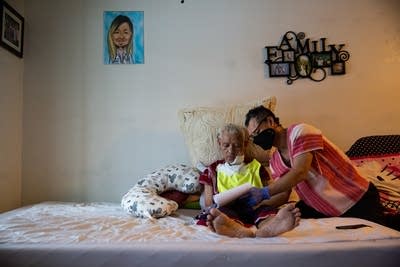‘A moment that almost didn’t happen’: St. Paul man with cancer becomes citizen at home

Go Deeper.
Create an account or log in to save stories.
Like this?
Thanks for liking this story! We have added it to a list of your favorite stories.
They had run from soldiers for as long as they could remember, lost a child, and then built a life from scratch again in the United States. Now Aung Myat, 76, and Bway Paw, 68, are enduring another battle inside their small St. Paul apartment: Myat is fighting stage 4 mouth cancer.
Bedridden and unable to speak, he isn’t expected to live much longer. So when the news came in December that Myat and Paw were being granted U.S. citizenship, the family and their attorney, Susie Thao of Southern Minnesota Regional Legal Services, scrambled.
“In a matter of 24 hours, local immigration attorneys, as well as the local immigration office and Judge [Donovan] Frank’s office were able to get this to happen,” said Thao, referring to a rare, private citizenship ceremony in the couple’s home Friday.
Myat and Paw are Karen, an ethnic minority from Burma, also called Myanmar. They, along with more than 10,000 Karen refugees, settled in Minnesota after fleeing a violent and oppressive military regime at home. Myat, Paw and their adult son, Way Htoo, arrived here in 2013.
Turn Up Your Support
MPR News helps you turn down the noise and build shared understanding. Turn up your support for this public resource and keep trusted journalism accessible to all.
“What we’ve been through, it’s a sad journey,” Htoo said. “Since we got the opportunity to come from a third-world country and finally arrive to America, it was an honor and we are very happy to be in this country. And I am very happy for my parents, for them to get their citizenship.”
Htoo is now a full-time caregiver for his father. As he fluffed Myat’s pillows and carefully fastened a mask over the bandages on Myat’s jaw, inspiration struck. Htoo hurried to unearth a bright blue and red Karen flag from a storage container and tacked it to the wall above his father’s head.
Within minutes, Judge Frank arrived and introduced himself.
“I am going to put on my robe because it’s an important day for each of you, but it’s an important day for our country, too,” Frank said.
Then, with Myat following along, Frank and Paw recited the Naturalization Oath of Allegiance to the United States of America. An interpreter on the phone translated it from English to Karen and back again.
“You are now each a citizen of the United States of America,” he declared after the last line came through in English over the phone.
“And I need to say this before we end and before I leave,” he said. “Diversity is the strength of this country. It’s people like you who make us a stronger nation. So it’s you who bless us today, too.”
Beneath the Karen flag, the couple held small American flags provided for the occasion and posed for photos.

The whole scene, and the couple’s pledge to “defend the Constitution from enemies foreign and domestic,” it all felt profound at a time of national strife. But when asked about it, Htoo's focus is on giving thanks — to a country that took them in and has offered them aid to care for Myat in his time of need, and to those who made the day possible.
Typically, oath ceremonies are held in auditoriums with dozens of people. U.S. Citizenship and Immigration Services and the courts do make accommodations for people who can’t leave home or are in the hospital. But it’s rare enough that this one was Frank’s first since the pandemic struck.
“America meant freedom. America meant opportunities for them and their children and grandchildren. And I’m so glad I got to witness this moment with them — a moment that almost didn’t happen,” attorney Thao said. “To help fulfill this dream for Mr. Myat and Mrs. Paw makes my heart so happy.”
Dear reader,
Political debates with family or friends can get heated. But what if there was a way to handle them better?
You can learn how to have civil political conversations with our new e-book!
Download our free e-book, Talking Sense: Have Hard Political Conversations, Better, and learn how to talk without the tension.






